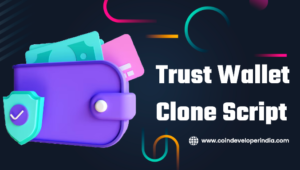If you’ve been delving into the world of digital currencies, you’re likely aware of the challenges that come with managing multiple cryptocurrencies. This is where a multi-cryptocurrency wallet becomes invaluable! In this extensive guide, we will demystify the process of creating multi-cryptocurrency wallets. Whether you’re an experienced trader or a curious newcomer, we’ve got you covered.
We will take you through the entire process, from grasping the fundamentals to exploring the advantages and features of these wallets. We’ll also delve into the crucial aspects of security, the different types of wallets available, and how to select the one that best suits your requirements.
So, get ready for an immersive journey into the realm of multi-cryptocurrency wallet development. By the end of this journey, you’ll be well-equipped to confidently manage your digital assets securely and with ease. Let’s embark on this cryptocurrency adventure together.
For Any Query Drop A Mail At: [email protected]
What are Multi-Cryptocurrency Wallets?
A multi-cryptocurrency wallet is a digital tool that allows individuals to store, oversee, and engage in transactions involving multiple cryptocurrencies through a single platform. In contrast to conventional wallets tailored for specific digital currencies, multi-cryptocurrency wallets offer a unified solution for overseeing a diverse array of digital assets.
Multi-cryptocurrency wallets are software programs that leverage blockchain technology to safeguard users’ private keys, which are necessary for controlling and accessing their digital assets. These wallets can handle numerous cryptocurrencies, enabling users to send, receive, and keep track of their balances across various blockchain networks.
Advantages of Using a Multi-Cryptocurrency Wallet
- Diversified Portfolio Management
Multi-cryptocurrency wallets allow users to manage a wide range of digital assets from a single interface. This streamlines portfolio management, making it easier to monitor and control investments in various cryptocurrencies without the need for separate wallets.
- Convenience and Efficiency
With a single wallet, users can send and receive multiple cryptocurrencies without switching between different applications. This simplifies the transaction process and reduces the hassle of managing multiple wallets.
- Cost-Effective
Multi-cryptocurrency wallets eliminate the need to pay separate transaction fees for each cryptocurrency. Users can save on fees and minimize the costs associated with managing a diverse crypto portfolio.
- Enhanced Security
These wallets offer robust security features to protect users’ private keys. By consolidating assets in one wallet, users can focus on securing a single point of access, reducing the risk associated with managing multiple private keys.
- Improved User Experience
Multi-cryptocurrency wallets are designed with user-friendly interfaces, making it easier for both beginners and experienced users to navigate the world of digital currencies. This enhances the overall user experience.
- Quick Asset Management
Users can quickly assess their entire cryptocurrency portfolio, view balances, and track performance within a single application. This real-time data access simplifies decision-making and asset allocation.
- Cross-Blockchain Compatibility
Multi-cryptocurrency wallets are often compatible with various blockchain networks, allowing users to engage with cryptocurrencies that exist on different blockchains. This flexibility expands the choices available for investments and transactions.
Types of Multi-Cryptocurrency Wallets
Multi-cryptocurrency wallets come in various types, catering to different preferences and security needs. Here are the three major types with detailed explanations:
Software Wallets
Software wallets, also known as desktop or mobile wallets, are applications that you install on your computer or smartphone to manage multiple cryptocurrencies. These wallets offer convenience and accessibility, making them a popular choice for everyday use. They are further categorized into desktop and mobile wallets.
- Desktop Wallets: Installed on your computer, desktop wallets like Electrum or Exodus provide a high level of security since they’re not directly connected to the internet. They give users full control over their private keys and are suitable for users who prioritize security.
- Mobile Wallets: Designed for smartphones and tablets, mobile wallets such as Trust Wallet and Coinomi are user-friendly and convenient for managing your cryptocurrencies on the go. While they offer mobility, it’s essential to secure your device against theft or loss.
Online/Web Wallets
Online wallets, also known as web cryptocurrency wallets, are accessible via a web browser. They offer ease of use and are suitable for those who want quick access to their cryptocurrency holdings. However, they are connected to the internet and, therefore, may be more susceptible to security risks.
Online wallets like Coinbase, Binance, and Blockchain.info allow users to manage their assets from any location with an internet connection. While convenient, users should prioritize security practices like two-factor authentication.
Hardware Wallets
Hardware wallets are physical devices that store your cryptocurrency offline, providing an extra layer of security. They are ideal for the long-term storage of significant cryptocurrency holdings and protect your assets from online threats. Popular hardware wallets include Ledger Nano S, Trezor, and KeepKey.
Hardware wallets are often considered the most secure option, as they keep private keys offline and require physical access to initiate transactions. They are immune to common online threats such as hacking and malware. While they are more expensive than software wallets, the peace of mind they offer is well worth the investment for serious cryptocurrency holders.
Each type of multi-cryptocurrency wallet has its advantages and disadvantages, and the choice often depends on individual preferences, security priorities, and usage scenarios. Users should evaluate their specific needs and risk tolerance when selecting the most suitable wallet type for their cryptocurrency management.
Must-Have Features of Multi-Cryptocurrency Wallet
A multi-cryptocurrency wallet is an essential tool for managing a diverse portfolio of digital assets. To ensure a comprehensive and secure experience, it should possess several key features. Below is a list of the major features of a multi-cryptocurrency wallet:
- Multi-Currency Support
The primary feature of a multi-cryptocurrency wallet is its ability to support a wide range of cryptocurrencies. It should be compatible with various blockchain networks and allow users to store, send, and receive multiple digital assets on a single platform.
- User-Friendly Interface
The wallet should have an intuitive and user-friendly interface to cater to both beginners and experienced users. Easy navigation and clear displays of balances and transaction history enhance the user experience.
- Security Measures
Robust security features are critical. Look for wallets with strong encryption, two-factor authentication (2FA), and biometric login options. Private key storage should be secure and offline to prevent unauthorized access.
- Backup and Recovery
In the event of device loss or failure, the wallet should offer backup and recovery options. This ensures that users can regain access to their assets and transaction history.
- Transaction History
A detailed transaction history is essential for tracking your cryptocurrency movements. The wallet should provide information on previous transactions, including timestamps, transaction IDs, and confirmations.
- Real-Time Market Data
Some wallets integrate real-time market data, allowing users to monitor the current prices, market capitalization, and trading volumes of various cryptocurrencies. This information is valuable for making informed investment decisions.
- Cross-Platform Compatibility
A multi-cryptocurrency wallet should be accessible on various devices, including desktop computers, smartphones, and tablets. This cross-platform compatibility ensures users can manage their assets from their preferred devices.
While these are essential features, it’s also important to consider factors like ongoing development, customer support, and the wallet’s track record for security. Regularly updated wallets with strong community support tend to offer a more reliable and feature-rich experience for users. Ultimately, the choice of a multi-cryptocurrency wallet should align with your specific needs and security preferences as a cryptocurrency holder.
Multi-Cryptocurrency Wallet Development Process
There are three major stages in the multi-cryptocurrency wallet development process that can be divided into further points. The following is the detailed process for developing a multi-currency wallet:
1. Planning and Design Phase
- Setting Objectives and Goals: Begin by clearly defining the purpose of your multi-cryptocurrency wallet. Determine whether it will be a desktop, mobile, or web-based application. Understand your target user base, their requirements, and the desired features.
- Determining Features and Functionality: Make decisions regarding the features and functionalities your wallet should offer, including transaction management, portfolio tracking, and integration with blockchain explorers. Consider adding extras like decentralized exchange integration or staking options to enhance the user experience.
- User Interface and User Experience Design: Create an intuitive and aesthetically pleasing user interface. Ensure that the design aligns with the preferences and branding of your target users. Focus on delivering a smooth user experience with clear navigation and informative prompts.
2. Development Phase
- Selecting the Appropriate Technology Stack:Choose the right technology stack for your wallet development, considering scalability, security, and compatibility with various operating systems. Common technologies include programming languages like JavaScript, frameworks like React or Angular, and blockchain integration libraries like Web3.js.
- Implementing Wallet Security Measures: Put in place robust security measures to safeguard user funds and data. Employ encryption algorithms for secure data storage and adhere to best practices in writing secure code. Conduct extensive security audits and penetration testing to identify and address vulnerabilities.
- Integrating APIs and Blockchain Networks: Connect your wallet to blockchain networks through APIs to enable essential wallet functions like tracking balances, retrieving transaction histories, and signing transactions. Ensure compatibility with popular blockchain platforms based on your target audience’s preferences, such as Ethereum or Bitcoin.
3. Testing and Deployment Phase
- Quality Assurance and Security Testing: Conduct thorough quality assurance and security testing to discover and rectify any bugs or vulnerabilities. This includes functional and stress testing, as well as simulating various scenarios to guarantee the wallet’s stability and security.
- Beta Testing and Feedback Collection: Release a beta version of the wallet to a limited user group for testing and feedback collection. Address any usability concerns or issues raised during beta testing to refine the overall user experience.
- Wallet Deployment Strategies: Choose the appropriate deployment approach based on your target audience and intended platforms. Options include app store distribution, web hosting, or direct downloads. Ensure the deployment process aligns with platform-specific guidelines and requirements.
How Much Does It Cost to Develop a Multi-Cryptocurrency Wallet?
The cost of developing a multi-cryptocurrency wallet typically falls in the range of $20,000 to $200,000. However, the final cost can vary significantly based on factors such as features and complexity, platform compatibility, security requirements, blockchain integration, user experience design, testing and quality assurance, regulatory compliance, and the development team’s hourly rates and geographic location.
It’s crucial to outline your project’s specific requirements and obtain detailed quotes to get a more accurate estimate. Additionally, ongoing maintenance and updates should be considered as part of the long-term operational costs of a multi-cryptocurrency wallet.
Why Hire Coin Developer India as Your Crypto Wallet Developer?
If you lack a background in software development, creating a cryptocurrency wallet might appear complex. However, this venture can be a lucrative source of passive income if you hire a multi-cryptocurrency wallet development company. However, finding the best crypto developer is as complex as finding a needle in a haystack.
Coin Developer India, with its team of experienced developers, offers top-tier web and app development services. With nearly a decade of experience, we guide you through the entire app development process. Their expertise extends to numerous crypto and blockchain projects, ensuring the best outcomes for clients.
What sets Coin Developer India apart is its proficient team, deep knowledge, flexibility in developing both custodial and non-custodial crypto wallets, and extensive industry experience. Its proficiency, advice on fundamental features, and ability to provide a variety of wallet choices make it a reliable choice for your project.
| Contact At: +91 7240607737
| Telegram: @Coindeveloperindia
Frequently Asked Questions
What is a crypto wallet?
A crypto wallet is a digital tool that allows users to store, send, and receive cryptocurrencies. It securely stores private keys, enabling access to your digital assets and facilitating transactions on various blockchain networks.
Is it necessary to have a crypto wallet to do crypto trading?
Yes, a crypto wallet is essential for crypto trading. It provides a secure place to store your assets and is used to deposit and withdraw funds on trading platforms.
How do multi-currency crypto wallets work?
Multi-currency crypto wallets support various cryptocurrencies and manage multiple private keys. They interact with blockchain networks, allowing users to send, receive, and track balances across different digital assets.
How Much Time Does It Take to Develop a Crypto Wallet?
The development time for a crypto wallet varies depending on its complexity and features. Simple wallets may take a few weeks, while more complex multi-currency wallets can take 6–8 months to develop and thoroughly test.








